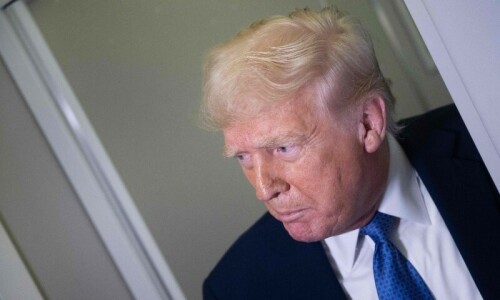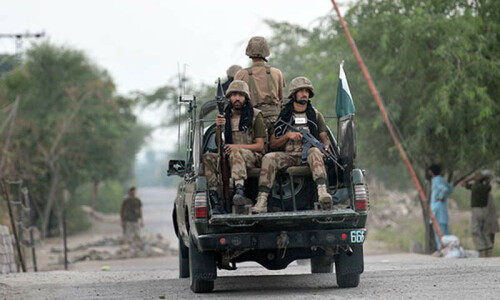
Prime Minister Nawaz Sharif enjoys the unique honour of being perhaps the only head of state who was present at the Earth Summit of 1992, where the UN Framework Convention on Climate Change (UNFCCC) was born, and also 23 years later in Paris to witness the start of COP21 which resulted in the adoption of the Paris climate agreement, this December. Pakistan’s federal Minister for Climate Change, Zahid Hamid, recently pointed out this fact at a media workshop organised by the Heinrich Boll Foundation in Islamabad on what Paris means for Pakistan.
As for the criticism of the PM’s short speech and quick departure for the airport in Paris that was widely reported upon in the media, the minister stated in his defence: “There were over 150 leaders of various countries and they all left after making national statements which set the tone for the negotiations. I think the PM made a positive statement and everyone was directed by the chair to speak for just three minutes. It is a difficult exercise to keep one’s speech so short. There were heads of state who went over the three minutes limit but the PM adequately outlined the measures we are taking and ensured that Pakistan’s position was reflected.”
Bilal Anwar, a climate expert who now works for the Centre for Climate Research and Development at COMSATS University in Islamabad called the Paris outcome, “A landmark agreement that was not perfect. But in all my years at these negotiations I have not seen a perfect agreement come out of the UNFCCC process. We have the agreement and we have to live with it.” Bilal was in Paris for the two weeks of the negotiations as part of the official Pakistani delegation and noted that there was largely positive coverage of the agreement in the international media. “I think the agreement is good enough, ambitious enough and robust enough.”
The Paris agreement sets developing countries on a course of enhancing adaptive capacity and increasing resilience
A lot of pre-planning went into the Paris climate summit and excellent work was done by the French government in both managing logistics and ensuring that everyone was included. The French Embassy in Islamabad started preparing for the conference a year earlier and held a number of events and meetings. Clearly, the French had learnt from the failure of the Copenhagen summit in 2009. They organised a number of pre-conference ministerial meetings in Paris, which helped the negotiations. As a result of all this activity, 187 countries of the world (out of a total of 196 countries which are signatory to the UNFCCC) submitted their “Intended Nationally Determined Contributions” documents promising actions at home, before the Paris conference. According to Bilal, this was the result of “high level mobilisation through the French diplomatic machinery. There was also a degree of transparency and inclusiveness. A positive mode and spirit of cooperation was maintained through out the two weeks”.
The two-week long negotiations that took place in Paris were less dramatic than the ones that took place in Copenhagen — there was less acrimony and hence less to report but there was certainly a spirit of camaraderie that was lacking in Copenhagen. Perhaps because the negotiations took place just a few weeks after the terrorist attacks in the city, there was enhanced cooperation and a feeling of solidarity with the French. Everyone knew in their hearts that there would be a positive outcome to the Paris summit and certainly people felt included and part of the decision making process. The French President himself maintained a high degree of presence at the negotiations that were held in Le Bourget, a town on the outskirts of Paris.
So what were the major principles of the Paris agreement? For one, the world agreed to limit the global average temperature increase to below two degrees with the aim of reaching to 1.5 degrees. In real emissions reductions that would mean 60 to 80 per cent cuts by countries in the second half of this century, which is actually quite ambitious. However, the divide between developed and developing countries was diluted by the agreement. According to Bilal, “The principle of common but differentiated responsibility is not as strongly anchored as it used to be. Now every country has some responsibilities — the argument of the historical responsibility of developed countries is not sustained anymore. There is also a shift in the approach to build mitigation actions based on domestic actions taken by countries; a bottom up rather than top down approach.”
“Nationally Determined Contributions” (NDCs) are also to play a key role in meeting the ambition and targets that are set out in the agreement. Hence INDCs have effectively become NDCs and they are likely to become binding in nature and conditional in support. Pakistan will be re-submitting its INDCs document according to the Minister for Climate Change once it has completed its green house gas inventory in the next few months and once the final shape of the China Pakistan Economic Corridor is agreed upon and we know exactly how many new coal power plants, etc. are going to be built. According to Bilal, “Pakistan has to go back to the drawing board and re-submit its INDCs which will become subject to independent review.”
This approach potentially allows the US president to approve the Paris agreement without congressional approval. He can say that it is the extension of the UNFCCC, which the US has already ratified, so there is no legal need to go through the Congress. John Kerry was there in Paris with his legal team coming up with this approach, which really allowed the US to participate actively. Remember, it was President Clinton who supported the Kyoto Protocol and returned to the US only to have the Congress decide that they would not approve it. “Hence the title is not Paris protocol but Paris agreement. It might work let’s see,” said Bilal.
The NDCs shall have to report emissions in a periodic and progressive manner and the idea is for countries to achieve peaking (of carbon emissions) as soon as possible but with the recognition for developing countries to take longer. This is important for Pakistan as it allows the country to build more fossil fuel power plants in the near future. As Bilal pointed out, “Our right to development is still there and secured by the Convention itself.” Global stock taking on the progress made will happen every five years starting from 2023. Now ranking number eight in this year’s global list of countries most affected by climate-related disasters, Pakistan needs all the help it can get in increasing its resilience.
Published in Dawn, Sunday Magazine, December 27th, 2015















































